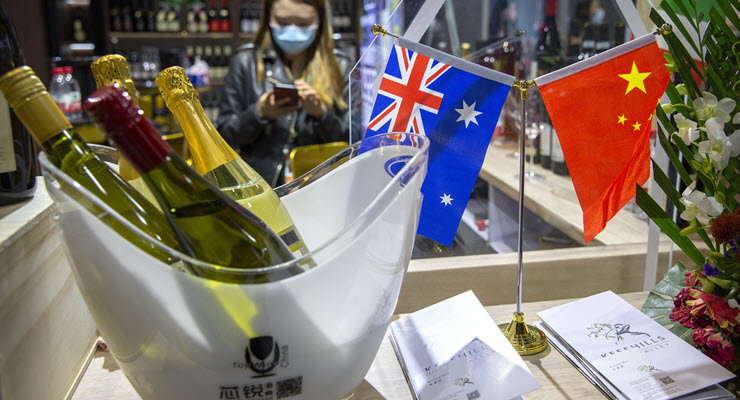
Can Australia break its dependence on trade with China? There are precedents. Not all of them are hopeful.
Australia has had a single dominant trading partner before. We were locked into the UK economy first and then, much later, to Japan.
As the chart shows, China’s outsized relevance to our national wealth is not without precedent. Japan had a similarly big role in the 1970s and before that the UK was even more dominant.
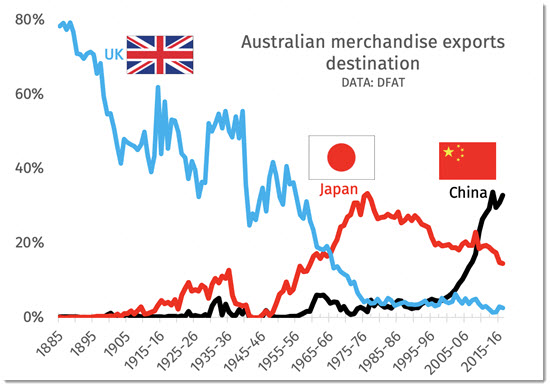
Might we be able to engineer changes that make China fade in our trade statistics? After all, trade relationships are not immutable. If Chinese babies aren’t drinking Australian infant formula, other babies will. If Australian wine is not being served at Chinese tables, there are places where it will be.
Perhaps.
However, when you look more closely at that graph two major observations must be made.
First, the changes in our trade relationships were made neither quickly nor by political whim. Instead they corresponded with the rise and fall of great powers.
The UK was the world’s biggest power up until World War II. It faded in global dominance thereafter and as an Australian trade partner. As it fell, Japan rose. The “postwar miracle” saw its economy surge, growing at a mind-blowing rate for several decades. Those are the decades during which it also comes to feature heavily in Australia’s trade statistics.
Second, the changes did not happen fast. Indeed, Japan remains our second biggest trading partner, and the UK is our eighth.
These two facts force us to consider our trade with China in a cold light.
It seems likely China will continue to grow. Precisely when it becomes the world’s largest economy is unclear. Some say it has already happened. If not, it will during the next few years. China’s performance in keeping the pandemic under control will only speed the process of overtaking the West.
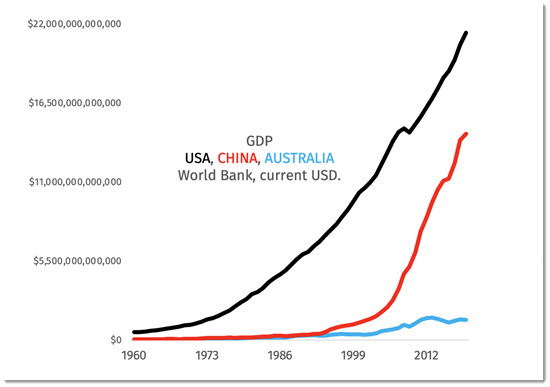
China’s economic potential is vast because its population is vast, and it can be expected to “catch up” to the economic frontier, like Japan and South Korea before it.
Catch-up growth — by adopting modern technology and building infrastructure etc — can be much faster than growth in advanced countries that have technology and infrastructure in place. If China simply catches up to the per capita GDP level of South Korea it can triple its economic heft. In so doing, it would be three times the size America is now.
In a recent book, American commentator Matthew Yglesias argues the US should treble its population to 1 billion to avoid being outcompeted by China and maintain US hegemony.
Now I’m amused by the idea of an arms race that strips the term of its metaphorical aspect and involves racing to produce more actual arms (and legs, etc). But the idea seems impractical. Similar thinking appears in more dilute (and more realistic) form when Australian policymakers call for a larger Australian population. Either way the lesson is the same: power depends on size. And China has size to spare.
Population size is a race in which China is not even competing. It has hobbled itself with a one-child policy. Its remarkable economic growth has been achieved without much population growth (unlike Australia). If China should decide to turn demographics in its favour and increase its population, it could grow even larger and more powerful.
So China is getting stronger, which suggests reducing our trade with it is an unlikely prospect. Can we make that a good thing — not a risk?
As long as China’s economy is growing, it will need steel. Perhaps not as much as before (as the next graph shows, steel intensity of GDP is usually highest when countries are in the earlier phases of growing rich) but still a great amount. And that will have it looking at Australia.
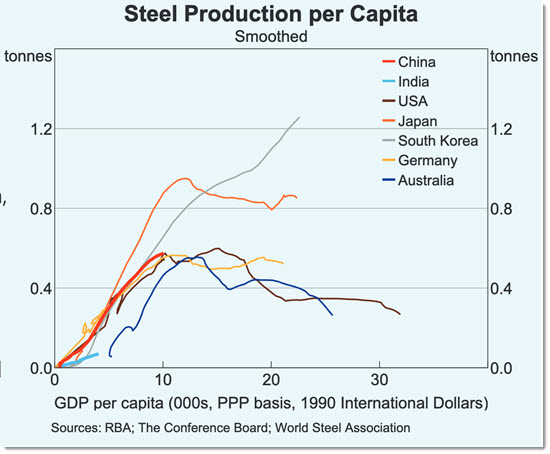
Economic links create strong person-to-person and business-to-business ties. They make both sides better off. They also raise the cost of conflict.
The conflict between Australia and China is very much top-down. It is not a popular uprising by the Chinese against Australia but a policy choice by President Xi Jinping. (His strong man tactics against Australia mirrors those of Donald Trump against China.) Prime Minister Scott Morrison has chosen to wade in.
These choices can be reversed, and indeed may be in the more stable global environment of a Biden administration. This is the hopeful outlook. But it is not the only one.
Examining Australia’s trade statistics for the past 150 years, looking for times when our trade relationships reduced, I found two other precedents. During the 20th century there were two episodes where a trade partner rapidly grew in importance then shrank to zero. These periods were, as the next chart shows, 1914-18 and 1939-45.
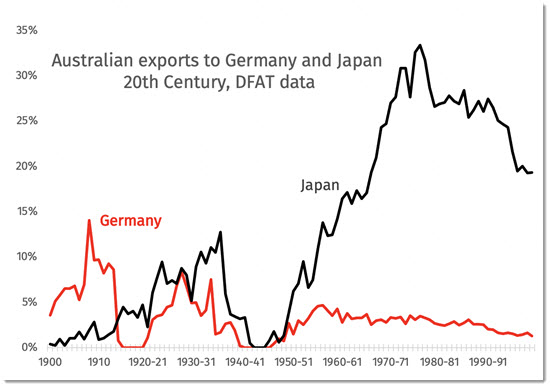
Look closely at the chart, and you can see that the trade relationships actually falter before the giant global wars start.
Is the drumbeat of tension between Australia and China the introduction to a larger conflict between China and the West? It is not without precedent. It took about a century to pay the price for forgetting the lessons of the Spanish flu.
Has it been so long since World War II that we’ve forgotten the importance of maintaining peace?








“Has it been so long since World War II that we’ve forgotten the importance of maintaining peace?”
Yes, there are examples all over history to show that what is learned the hard way by one generation is communicated quite effectively by them to their children, but it fades rapidly for later generations who see it all as myths and legends. So we are in exactly the right place to forget.
The brilliant idea of competing with other nations by increasing birth rates and population might make some sense when the analysis is wholly restricted to a narrow view of economic development. Back in the real world of finite space and resources, and the increasing crisis of climate change, it is about as clever as fending off a hangover by ever-increasing consumption of alcohol. There are several huge and difficult problems likely to bring total ruin to our species in the next several decades. The only effective prevention measure available is reducing our population. But hardly anybody is ready to face the consequences.
If the Western lifestyle reduces its population, it will just have to up the ante of consuming more times per head the worlds resources, to keep with the ever increasing standards of progress that it has grown accustomed to…/s
What is all the fuss about? China is still taking our barley. It’s just all being channeled through a proxy albeit at a discount of $30 – $50 per ton. Ouch, but better than nothing.
There’s plenty of iron ore in Africa. Business is business, China is mainly business. Personally, I prefer China to America. Who asked us to kill Vietnamese, Iraquis and Afghans? Not China. Who buys our stuff? Not America. I could easily go on, but there’s only so much actual reality you can stand at one time.
A lot of countries produce Iron Ore but only Australia has a quality grade that exceeds all these other places.
If China could find a country ( which is why they are searching Africa) for a quality grade ore as rich as Australia then they would be no longer buying our ore.
Simandou in Guinea, significantly higher grades than the Pilbara (2 billion+ tonnes at 65%).
Chris Ellison from Mineral Resources said at their AGM, just last week, he has no doubt China will be getting 100m tpa from Simandou by middle of the decade.
To paraphrase Ellison; ‘Be in no doubt China will get it done, and more’.
One of China’s partners is Rio who have held a long term interest in Simandou. What they lose in Oz they gain in Guinea.
True, John.
This is Australian arrogance that we have the “highest quality”. Brazil produce to the same quality as Australia. Covid has impacted their production (one of the many reasons China is testing their vaccines in Brazil) but once it is under control, look to Brazil taking more and more of our trade in this area. China has a good trading relationship with Brazil.
China has upgraded its Port facilities to accept the Vale Max bulk carriers to allow Brazil to compete directly with Oz. It’s obvious China is looking hard at its supply chains to its own best advantage.
I spoke with Chinese civil engineers, last year, who were occupied widening the Panama Canal in preparation for the tankers from Venezuela where the PRC is repairing the refineries.
The current Front Bench is utterly clueless and ditto for the Opposition.
And once the power balance is there to allow it the route through Nicaragua will be developed to massively increase capacity of both traffic and size able to transit. Exciting time to be an engineer in China, I’ve had the privilege of meeting some of the aged and now gone UK cohort who did similar in their day and age.
The objective of two million engineers per year has been met. Hardly anyone in the Australian government comprehends the arithmetic.
The necessary component for any success BRI is to have whether repairing refineries in Venezuela, building pipelines in Myanmar or railways in Laos. The sheer scale of the enterprise is incredible
Looks like the ModBot doesn’t know Trollope’s work.
At the tender age of 13 it was Trollope, and his reflections upon Anglicanism, that converted me to atheism.
Just out of curiosity, did the modbot block your use of the author’s surname as it did my two?
Probably ‘thinking’ that it meant putain?
No. The filter could have been modified. There was a time when ‘Charlie Dickens’ caused issues.
Sounds like the Mexican railway in Anthony Trollope’s “The Way We Live Now“.
Vijay Prasad, Counterpunch, about a week ago, included quotes from the Venezuelan FM, on China’s ‘pandemic support’ to Venezuela, and the view from Caracas that China fosters relationships across the board, but does so without ‘political interference’.
A view echoed across much of Latin America, as Vijay has been covering for years.
From my perspective, David, no one in Latin America is deceived and I was fortunate to have a few very useful chats in Guayaquil which is quite a modern city in Ecuador.
Yet the “leg up” and future opportunities offered by the PRC is significant to say the least. Developments in Africa pursue a similar theme.
Thanks, I was wondering when it would be realised that the Panama canal would become crucial.
Remember the kerfuffle post the Six Dar War, which closed Suez for a generation, which spawned the supa-doopa giant megatankers to make the journey around Cape of Good Hope to keep Europe on the drip.
Then came North Sea oil and the blue eyed Arabs of Norway.
(Britain, as always, pissed it away on 5M U/E throughout the 80s.)
Again, on the money, John.
It would have been a very different picture, had the Vale tailings dam not given way a coupla years back.
How can you publish an article about the future growth of the Chinese economy without even one word about demography? The country will have over 329 million people over 65 years of age by 2050. No effective social security net, and the children (and grandchildren) of one-child households will bear responsibility for their elderly parents and grandparents. It is unlikely that sufficient resources will then be available for geopolitical grandstanding.
Just where do you get your information mate? It might be of interest to you that the fertility rate in the PRC is approximately that of the West and such tends to occur as living standards increase. By comparison, India’s population is out of control as it is (at 4%+) for most of the African States. Within 15-20 years such countries will not have the productive capacity to feed themselves.
Pensions are available at age 60 in the PRC. Can you think of a Western comparison? Many countries in the West are murmuring over returning to the age that Bismarck initially set pensions.
May I suggest a revision of your perspective based upon authorative sources.
Just for comparison, for the last 20yrs this country has increased its population by 4%+ pa due to a massive immigration programme of 200K pa (that was the figure for primary visa holdfer, not including spouse/s & dependents, not necessarily children).
Slightly dented, if not crushed by C19 this year but certain to bounce hack – gotta keep that building industry reaching for the sky.
Please check my arithmetic A.911
Stats from ‘ole faithful’
Population 2000 19.15m
Population 2020 26.1m (25.5m @ mid year)
% growth 36.3% over 20 years 1.56% or 1.6% PA (compounded).
At 4% PA the compound growth factor would be 2.19 or a present population of 42 million (41.96)
Such is an illustration of just how f.ing scary such growth rate is.
At least, in principle, Oz can regulate the tap and, possibly, put a tax on kids as well but the countries that I identified have no prima facie solution to their own population problem other than to emulate China and Singapore.
I think the more likely outcome is that our children will be guest workers in China (& India) on a pittance wage doing aged and childcare and domestic services, given Australia’s apparent desire to be ‘competitive’ economically by growing the the population and lowering wages. The smart country?
Zoe Fairbairn’s “BENEFITS” did that in 1979 with oik brits in sealed trains from Waterloo (sic!) to whichever Eurofabricant needed broadbacks and no brains.
Agree, as I wrote above, many demographers and researchers e.g. Canada’s Bricker & Ibbitson (since then The Lancet has also published similar), claim on the ground, evidence shows declining and flatlining fertility rates, including India, hence mid century population peak then decline (they fear a precipitous decline).
However, this is not reflected in UNPD projections reaching inflated population peaks by end of the century adding fuel to the Anglo eugenics based obsessions about population growth; blamed for environmental issues and fossil fuel sector avoids constraints.
The whole world is becoming older, browner, hence the ‘tipping point’ or ‘great replacement theory’ of brown people outnumbeirng white people has arrived. Meanwhile according to science journalist Fred Pearce, old people now outnumber young people globally due to better health and longevity, not breeding like rabbits, that stopped decades ago….
WWII was the consequence of one man’s agenda. It is now necessary to understand Xi. He wants his legacy to include the re-unification of China and there is probably no better time than the present, notiing the parlous state of major Western democracies. Presumably he wants to take Taiwan with as little local fighting and damage as possible. One way to tell any ally of Taiwan’s to stay away would be to pre-emptively neutralise Australia’s navy and airforce. Our allies would express outrage, but decline to intervene militarily in order to avoid another World War, where Russia might join on China’s side. This has happened on our watch due to our failure to remember and learn from the lessons of history.
Are you referring to Lloyd George? One would have to include Versailles and the rejection of 12 of the 14 items offered by Woodrow Wilson. The Crusades (over centuries), by way of an example, were NOT a consequence of “one man’s actions” either.
The only aspect where you are correct is with the ANZUS document that guarantees nothing. The consequences of PRC dominance in the South China Sea are a given and out of Australia’s hands.
“WWII was the consequence of one man’s agenda.”
Good grief, what unhistorical nonsense. For a large part of the world’s population, perhaps a majority, that war began in 1937 when Japan invaded Manchuria / China. The conflict in Europe, if we start with Germany and the USSR in league invading Poland, is easily traced to the terms of the Treaty of Versailles. That was the work of many hands, none of them belonging to the one you seek to blame. Germany’s grievances over the treaty would likely have boiled over regardless of which individual was running the country; several present in 1919 when the treaty was negotiated predicted as much, including J M Keynes. The European conflict was running for over two years before Japan directly attacked the USA, which again had nothing to do with your individual. There is the fascinating possibility that if that individual had not taken the completely unnecessary and reckless step of declaring war on the USA at that time, the USA would have fought Japan only and ignored Europe, leaving the UK and its empire by themselves to cope as best they could.
WWII derived from many causes totally independent of that one man, even though he had a large part in some parts of it. The tendency to pile all the blame on one man – making him some sort of monster with, in effect, supernatural powers to bend whole nations to his will and, through nothing but the force of his uniquely evil character, bring ruin on the whole world – is a truly childish simplification and a very cheap way of exonerating from blame all the others who contributed to the catastrophe. It also makes it far too easy to feel confident nothing like it could happen again, given how such a character must be unique.
Having read your post, SSR, a reader who gives a damn could do worse than concern himself with
Keynes, J.M “The Economic Consequences of the Peace”.
Indeed. The book is out of copyright so it is easy to download a free copy off the web.
The reader who gives a damn would also do well to search out a program I’ve just watched, E.
The program is “On Contact”, is presented by the Pulitzer winner (when it meant something) Chris Hedges, and he has a chat with Gabriel Rockhill, in an episode titled;
“Fascism- America’s DNA”
Even just Hedges’ intro is worth the effort.
Precis of the half hour chat;
Chris Hedges talks to Gabriel Rockhill about the undercurrents of fascism in America’s DNA, and the US role in internationalizing fascism after World War II through clandestine activities such Operation Paperclip and Operation Gladio.
Rockhill is a Franco-American philosopher and the founding Director of the Critical Theory Workshop and Professor of Philosophy at Villanova University. His books include Counter-History of the Present: Untimely Interrogations into Globalization, Technology, Democracy, Interventions in Contemporary Thought: History, Politics, Aesthetics, Radical History & the Politics of Art and Logique de l’histoire.”
That underdoes the chat because, as they explain, European fascism in the ’30’s was modelled on the earlier US fascism, represented by the KKK.
Gritting my teeth, I read (former SofS) Madeleine Albright’s book on (order everyone please) F.ism. Yeah. Composure restored. Once upon a time such people had signing authority.
Naturally wars have antecedents, but to trigger war requires current decision-makers. Matters right now might be very different if the Chinese Civil War had ended differently in1949 and the Republic of China led by Chiang Kai-shek had not been required to retreat to Taiwan. But it is Xi’s agenda that matters now, just as the decision to invade Poland on 1 September 1939 is generally accepted as the beginning of WW2.
Such is a reasonable composition for the upper Yr8 or average Yr9 but a fail (except at some government schools) at Yr11.
We will get to historical contingencies but the origin of WW1 can be located with the Franco-Prussian war. An analysis of the origins of this war would take us too far afield but paranoia featured prominently. In other words, WW1 brewed for something like 40 years (and was not about an arch Duke being knocked off by a Serb). The reason for the Ottomans siding with the Germans is no less complex.
Political personality can be a contributing factor to events. Had something like Cuba 1962 been between Reagan and Brezhnev or Putin fireworks may well have resulted. Initial conditions and boundary conditions do effect events but it is a blunder to mistake a single event for a single cause.
If the relevance of history was limited to being a subject for arbitrary academic grading then we could all relax. But the relevance right now is that when a powerful autocractic leader has publicly and repeatedly declared his determination to return Taiwan to mainland China, and visited his troops to tell them to prepare for war, history offers us recent examples where such pronouncements foreshadow catastrophic outcomes.
History is a big deal Chris. Herewith a few notes (all easily confirmed)
Until the 1500s Malayo-Polynesian occupied the island when the Dutch East India Company established a base in southwestern Taiwan. From the early 17th century Spanish privateteers established bases in northern Taiwan, but were flicked by the Dutch in 1642.
Manchurian conquests of the Ming dynasty (1368-1644) ultimately flick the Dutch from Taiwan and establish authority over the island.
Qing dynasty forces take control of Taiwan’s western and northern coastal areas. Subsequently, Taiwan is declared a province of the Qing Empire (1644-1912) during 1885.
Following defeat in the First Sino-Japanese War (1894-1895), the Qing government signs the Treaty of Shimonoseki, by which it cedes sovereignty over Taiwan to Japan, which rules the island until 1945.
The ROC government relocated to Taiwan in 1949 while fighting a civil war with the Chinese Communist Party.
Such is a realistic sketch of the history Chris. It should be obvious that the PRC does have a claim for the island and a “one country – two systems” arrangement is inevitable.
As to changes in global dominance : absolutely and it will be wise to become accustomed to the new order.
More importantly to sustain the claim was that when the Japanese forces arrived to take position their was organised opposition to their takeover that took the Japanese 18 months to suppress. The Senaku Islands are also mixed up in this as the US chose to leave them in Japanese hands rather than return them to Taiwan. Oz also has a deeper interest as the aboriginal inhabitants of Formosa/Taiwan are related to our own Koorie in Oz. They just went in a different direction and met different others.
Agreed, but let’s watch the “reality” unfold John. This is the major project for the PRC.
I had the privilege of meeting Lee Kwan Yew and his wife Kwa Geok Choo in London and when asked where he saw the worlds most dangerous flashpoint replied without hesitation Taiwan. So it remains. It wouldn’t be beyond belief for the balloon of Taiwanese independence to be encouraged to inflate to such an extent that Tsai Ing-wen or similar decide to declare some form of independence. The immediate consequences of their ‘defeat’ would be as good a Casus belli as one could hope for. The Philippines refused to play ball via the UNCLOS judgement. From a US perspective things have already reached Put up or Shut up and accommodate. Obama & Hilary went for the Pivot to Asia and Trump for waving what he saw as a Big Stick to get a dominant accommodation. I suspect we are back to an Obama upgrade of Pivot to Asia. Oz will need a whole series of fine judgements to be made to come out of all this in a recognisable state.
Thanks for the reply John. There is not a lot to add other than that Lee Kwan Yew was a very perceptive guy who understood the Western “mentality” completely.
An item of counterpoint is deserved however. Obama’s Pivot to Asia possessed any number of imbecilic assumptions yet both the Pivot and Trump’s initiatives (for the want of each superior word) were directed at undermining the clear objectives of the PRC. Needless to say that NEITHER policy had any effect; in fact to contrary.
Rudd, displaying both his lack of comprehension and a desire to cuddle with Uncle Sam, declared the Pivot a good thing.
Pity about the aboriginal inhabitants of the Japanese islands, the hairy Ainu, now almost extinct and confined to parts of Hokkaido.
Probably Denisovans whose genes are well represented in this country.
He Who Must Not Be Named would have brought forward the Napoleonic dream of a unified Europe had it not been for the RedBeard madness.
You are not one for detail Jason. Britain was dominant to about 1910 (Edward VII). The yanks turned up with “real” bandages in 1917 and it was American productive capacity that prevailed over WW2.
The history is important (agreed) but the rapid developments in research are changing the picture almost by the Qtr. The advantages of developing a research, diplomatic and trade relationship with the PRC are (or ought to be) only two obvious.
Someone (SSR?) mentioned Matthew 7 1 recently. A glance at 7 12-13 is worth the effort too.
I am very familiar with the “wide gate.”…just about everyone I know has chosen the wide gate. Do you care to elaborate on that “narrow gate”?
Matthew yes. Apologies for tardiness but the prospect of a PM buggering diplomatic and trade relationships for years to come (putting the consequences to Gen Z to one side) acquired a higher priority.
Taking Matthew on the whole, doing the right thing for the right reason is not something commonly observed. The self-first brigade comprise the majority (and illustrated by school boy economics) and, thus their gate is wide but also leads (only) to eventual self defeat.
Political parties anyone?
I immediately asked myself the question as to why Scottie from Marketing opted to respond as he did. The bait by a Deputy in Foreign Affairs was set to see which way the Oz Govt would jump, as at that level it could have been ignored other than to use Our man in Beijing to take appropriate action. But no, our equivalent to Xi opted to wade in playing fit to bust to the Home audience. Is the Anglo-sphere organising for a significant throwing of the gauntlet. Gareth Porter amongst serious others is convinced the Pentagon is organising for such.
Morrison and Trump do appear to have a lot in common and particularly a distaste for views contrary to their own.
I suggest that HE thinks that the chest-beating is gaining him points but, in fact, it is portraying him as an idiot.
The prospect of an ‘Asian Century’ is being met with a gnashing of teeth by some but it is also inevitable.
Indeed, the options are only cooperative liaison or physical conflict.
12 Therefore all things whatsoever ye would that men should do to you, do ye even so to them: for this is the law and the prophets.
13 Enter ye in at the strait gate: for wide is the gate, and broad is the way, that leadeth to destruction, and many there be which go in thereat: